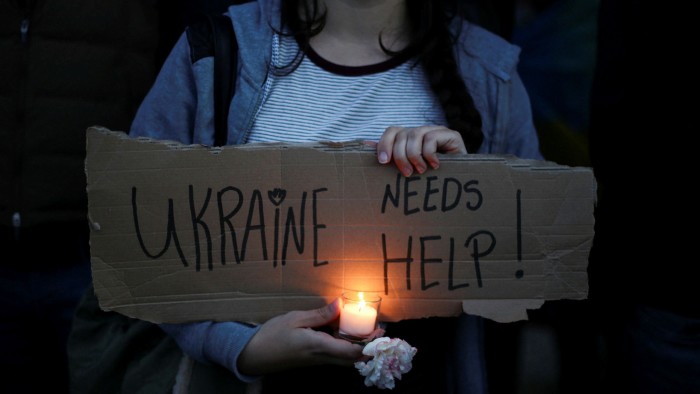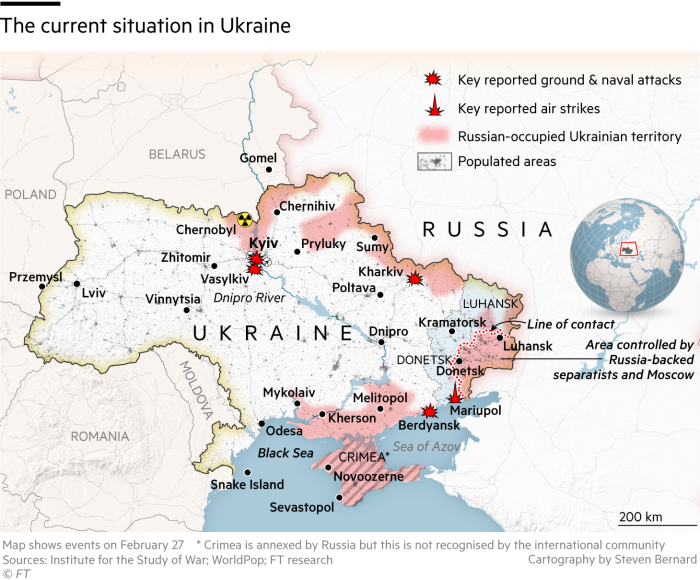EU heeds Ukraine’s calls on sending weapons

Simply sign up to the War in Ukraine myFT Digest -- delivered directly to your inbox.
Greetings on this fast-paced day dominated by the war in Ukraine.
For many months, the US, the UK and eastern European nations were the only ones sending arms to Ukraine. But over the weekend, France, Germany and other nations that had so far insisted on sending only non-lethal aid to Ukraine U-turned and said they would also send weapons. Last night, another Rubicon was crossed when EU foreign affairs ministers approved allocating €450mn from the bloc’s budget for arming Ukraine — for the first time ever.
Defence ministers will meet today to iron out the details of how these supplies can be delivered, after Poland offered to serve as a logistics hub. I’ll look at what this latest measure means and why the timing of the policy change is still frustrating some officials.
A fresh round of sanctions adopted last night includes another longstanding request from Kyiv, to cut off Russian banks (at least some of them) from the Swift messaging system and banning the central bank’s ability to fund the war on foreign exchanges. (Here is the FT’s explainer on how the sanctions against the Russian central bank are likely to work and here’s one on all the sanctions adopted so far by the EU, US and UK.)
Meanwhile, the so-far reluctant Swiss are also falling in line, with the country’s president saying it was “very probable” that the Alpine country would follow the EU and freeze the assets of blacklisted Russians today.
As hundreds of thousands of Ukrainian refugees have started arriving in EU countries, we’ll also explore what measures the bloc is taking to speed up their reception, under a clause used only once before, after the war in former Yugoslavia.
And with one aspect of the sanctions package likely also to apply to Russia’s gold reserves, we’ll analyse what this means for the country’s gold mining industry.
The Financial Times is making key Ukraine coverage free to read to keep everyone informed as events unfold. This article is an on-site version of our Europe Express newsletter and is usually available only with a Premium subscription. Are you currently a Standard subscriber? Click here to switch your subscription to Premium. Not yet a subscriber? You can take out a Premium subscription here
Arming Ukraine
A major shift occurred in the past two days, with nearly all western European nations (notably Germany and France but also the Nordics, Belgium and the Netherlands) announcing they will send weapons to Ukraine. And last night, so did the EU itself, with foreign ministers deciding to use €450mn in EU money for lethal aid to Ukraine, a first in the bloc’s history.
“For the first time ever, the European Union will finance the purchase and delivery of weapons and other equipment to a country that is under attack,” said Ursula von der Leyen, European Commission president.
Foreign ministers gathering by video link last night endorsed the plan, said EU foreign policy chief Josep Borrell, adding that Poland offered to serve as logistics hub for the deliveries. He said the money would be used to buy all sorts of equipment, including fighter jets — something the Ukrainians had asked for.
Countries that are traditionally neutral, such as Ireland and Austria, will be able to contribute with non-lethal aid, which the EU will reimburse to the tune of €50mn.
The fact that Ukraine’s president Volodymyr Zelensky refused to take a “ride out” of his country offered by the US, but also that Ukrainian soldiers and volunteers are putting up a much tougher fight than expected, combined with mass protests in Berlin and other European cities, have contributed to the policy shift, say EU officials.
Still, some EU officials could not shake off the feeling that the time it took for this shift to happen in Berlin, Paris and other capitals, despite all the intelligence shared by the US and calls from central eastern Europeans to beef up support for Ukraine before the invasion, was underpinned by a certain degree of cynicism.
The comment out of the Elysée Palace on Saturday noting drily that “Ukraine chose the path of resistance” almost rang like feigned surprise to some officials. “There was really a perception that Ukraine would fall in one to two days and the EU could just wait it out, before resuming talks with Putin,” said one EU official.
The EU’s initial reluctance last week to go for full-blown sanctions right away could be interpreted as a way to hedge its bets, particularly given the amount of gas the bloc imports from Russia. But there was also the factor of Russia being a nuclear power — something that Vladimir Putin reminded everyone of yesterday when he put his nuclear forces on high alert.
Chart du jour: Russian gains

Russia stepped up artillery assaults on the capital Kyiv and the eastern city of Kharkiv, which it continues to encircle slowly. Inside Kyiv, however, Russian troops that had breached the city continued to encounter strong resistance. (More here)
Help for refugees
The UN refugee agency said yesterday that about 368,000 Ukrainians had fled the country, mostly into bordering EU nations Romania, Poland, Hungary and Slovakia. As the numbers grew, EU interior ministers gathered yesterday for an emergency council to consider further assistance for the refugees, write Javier Espinoza and Valentina Pop in Brussels.
The EU commission is estimating that up to 7mn people might flee the war and destruction in their homeland. “We are witnessing what could become the largest humanitarian crisis on our European continent in many, many years. The needs are growing as we speak,” said Janez Lenarcic, the commissioner for humanitarian aid and crisis management.
Speaking after the meeting, German interior minister Nancy Faeser said that there was a deal for a “temporary protection” clause applied after the war in former Yugoslavia, to be used for Ukrainian nationals fleeing the war. The European Commission will prepare the legal work and interior ministers will approve it at their regular meeting on Thursday, Faeser said.
“Concretely, this means that we are creating the same, unbureaucratic procedures for receiving people fleeing from war. Refugees from Ukraine will not have to go through asylum procedures. They will be granted temporary protection in the EU for up to three years,” she said.
The temporary protection status will also enable the refugees to get access to social welfare, employment and schools for their children, said the Danish interior minister.
The EU home affairs commissioner, Ylva Johansson, said that most Ukrainians who had arrived so far had their passports on them, which enables them to stay visa-free in the EU for three months. (Ukraine has a visa-free regime with the bloc.)
“We need to be prepared for day 91 and for a much higher number of people trying to come who should be welcomed by the EU. That’s why I think it’s time now to activate the temporary protection directive, to support the Ukrainians,” Johansson said.
She added that the refugees were already leaving the first countries of arrival and heading towards the EU countries with a large Ukrainian diaspora — Poland but also Italy, Portugal, Spain, Germany and the Czech Republic.
Russian gold rush
Russia’s central bank could be forced to start purchasing gold from domestic miners frozen out of international markets by US, UK and EU sanctions, writes Neil Hume in London.
The Bank of Russia owned just under 2,300 tonnes of gold at the end of November, according to the World Gold Council.
At current prices, its hoard of the metal — the sixth largest in the world — is worth $153bn and accounts for roughly a fifth of the bank’s official reserves.
Rumours that Russia might seek to sell down some of its holding following the invasion of Ukraine hit the price of bullion last week, which came close to breaking above $2,000 a troy ounce before retreating.
But rather than selling gold in a main bullion centre such as London or Switzerland, Russia’s central bank is more likely to start buying the metal, traders reckon.
That’s because domestic gold producers such as Polymetal or Polyus are likely to find it very difficult to access international bullion markets because of sanctions placed on Russian banks.
As such, they are likely to turn to the central bank, which can provide the roubles they need to pay staff and supplies in exchange for gold.
This is something that has happened before, according to analysts. Following the annexation of Crimea in 2014, Russia’s central bank stepped up its purchase of gold that domestic producers struggled to sell overseas. Between 2014 and 2019 it acquired more than 1,200 tonnes of gold, according to WGC data.
For Moscow, the purchases were also a way of reducing the country’s exposure to US dollars in its official reserves.
The Bank of Russia halted purchases in April 2020 as oil prices dived because of the pandemic, hitting Russia’s national income.
Should the Bank of Russia want to sell any of its huge stockpile of gold, analysts reckon, it would have to turn to China where the metal could also be used as collateral for swap lines.
What to watch today
Defence ministers meet on logistics of arming Ukraine
Fresh round of EU Russia sanctions is set to enter into force
French foreign minister Jean-Yves Le Drian addresses UN Human Rights Council in Geneva
. . . and later this week
European Parliament holds an emergency session on Ukraine tomorrow
EU interior ministers meet again Thursday to take further assistance measures for Ukrainian refugees
Notable, Quotable
German U-turn: Russia’s invasion of Ukraine triggered a quick reset in Berlin, with chancellor Olaf Scholz yesterday announcing a €100bn fund to modernise the military and meet Nato commitments of spending 2 per cent of gross domestic product on defence by 2024. In recent days, Germany has also scrapped the Nord Stream 2 gas pipeline project, approved cutting Russian banks from Swift and pledged to deliver weapons to Ukraine.
UK visas: British MPs have demanded that the government makes it easier for UK residents to bring family members fleeing Russia’s invasion of Ukraine to join them in Britain. The Home Office is at present issuing visas inside Ukraine only to close family members of British citizens who normally live in the country.
Polish warning: In an op-ed for the Financial Times, Poland’s prime minister Mateusz Morawiecki is giving an ominous warning on Vladimir Putin’s intentions going far beyond Ukraine. “Today, we are seeing that the price of European naiveté over Russia is Ukrainian blood,” he writes.
Tow back to Russia: In an extraordinary exchange captured on a mobile phone, a Ukrainian man asked Russian soldiers who had pulled their tank to the side of the road and said they had run out of fuel whether he could tow them back to Russia.
Are you enjoying Europe Express? Sign up here to have it delivered straight to your inbox every workday at 7am CET. Do tell us what you think, we love to hear from you: europe.express@ft.com. Keep up with the latest European stories @FT Europe.
Comments